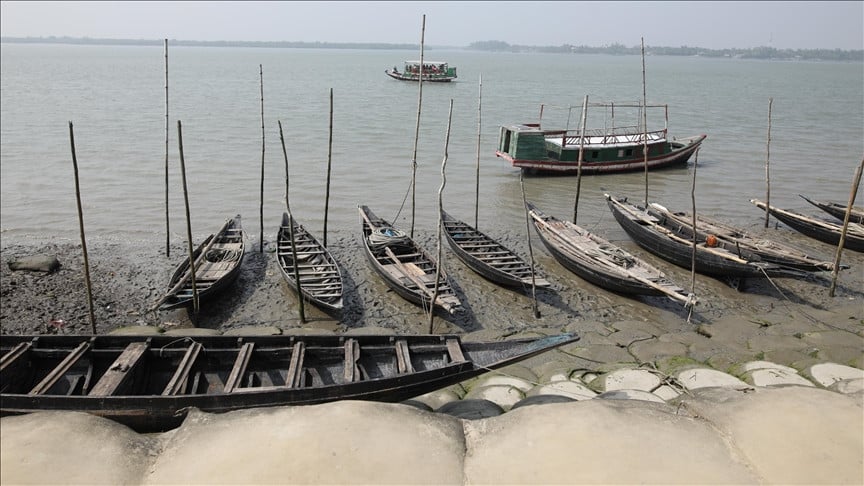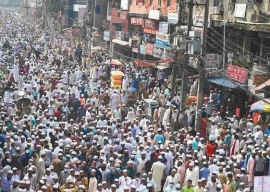
Although flooding has become a routine annual affair in Bangladesh, more than half of its rivers have become unnavigable and many more have vanished, affecting the livelihood of millions in the South Asian nation.
As the world is marking Environment Week this week, experts say that engineering and the dredging of river beds and reclamation of land have become necessary.
Out of 405 rivers dotting the geography of Bangladesh located at the delta, only 172 are currently navigable, according to officials. There are 57 trans-boundary rivers, including 54 common with India, and the remaining three with Myanmar.
Read more: Bangladesh scraps women-only beach zone after outcry
Speaking to Anadolu Agency, River and Delta Research Centre (RDRC) Chairman Mohammad Azaz said that many rivers in Bangladesh have vanished in the last 50 years while many others lost navigability.
According to the group, there were a total of 1,274 rivers in Bangladesh in 1971, when the country gained independence. Since then, a total of 507 have vanished.
“Three mighty rivers – the Ganges, Jamuna (Brahmaputra), and Meghna – flow across Bangladesh and end in the Bay of Bengal. So any river control initiative taken upstream of the three mighty rivers will affect Bangladesh,” said Azaz.
He said that rivers in Bangladesh have vanished due to the effect of the Farakka Barrage – an 18-kilometre (11-mile) barrage built on the Ganga River in the Indian state of West Bengal, bordering Bangladesh.
"Many small rivers and tributaries in the south-central Barisal region and northern districts have also disappeared. Upstream India withdraws a massive quantity of water from main rivers, leaving little supply downstream that affects tributaries and riverlets in Bangladesh," Azaz added.
Water crises
A similar situation has been prevailing around the Teesta River, which crosses northern Bangladesh. The 414-km (257-mi.) river originates in the eastern Himalayas.
“There are 11 small rivers that, depending on the water flows of Teesta River, are now dying. Teesta itself is dying and emerges as limitless char during the dry season, and agriculture depending on it faces a severe water crisis for irrigation,” he said.
A further 67% of land in Bangladesh is inundated or becomes wetland during the rainy season. But what has been the main source of concern is that the off-season rains and flooding have been affecting farmers and food security.
“Such a situation every year affects the whole food production and price hike of essentials, and farmers count huge losses,” he said.
According to government data, paddy grown on 5,000 hectares (12,355 acres) of land in the Hoar region bordering India was submerged and destroyed in a pre-monsoon flood.
“In the name of flood control mechanisms and management, we have built so many river embankments and switch gates, including in the coastal region of the country, which is not suitable for flood control, but rather destroys the fertility of canal, pond, and wetlands,” said Azaz.
He said politically influential people grabbing river land has also affected the navigation of rivers.
Read more: How to positively transform ties with Bangladesh?
According to government data, there are over 4,900 river grabs in all 64 districts.
Azaz said a list of dead and endangered rivers should be drawn up and immediate measures like undertaking sustainable dredging should be drafted.
Weak diplomacy
“A river could be dead or affect other rivers to die if we dredge rivers in an unplanned method," he said.
Azaz called for the use of modern technology and transparency in the process of reclaiming rivers.
“This poor health of rivers prevails due to weak diplomacy. We prepared the Bangladesh Delta Plan-2100 but we don’t have a definite policy as to how we deal with the constant challenge and negotiate with India for a fair share of waters of common rivers,” he said.
1725523665-0/Minecraft-Movie-(1)1725523665-0-405x300.webp)



1732086766-0/BeFunky-collage-(74)1732086766-0-165x106.webp)
1732085354-0/insta-(1)1732085354-0-270x192.webp)













COMMENTS
Comments are moderated and generally will be posted if they are on-topic and not abusive.
For more information, please see our Comments FAQ